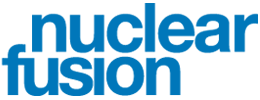Abstract
I would firstly like to convey my best wishes for 2006 to our readers, authors and referees. There are also some issues that I would like to communicate to you in this first issue of the new year.
Farewell to Editorial Board members
In 2005 the terms of office of half the Editorial Board came to an end. We would like to thank them for their wise advice on difficult questions, the innumerable cases where they have acted as adjudicators and for the many other forms of support they have given to the journal. While we say farewell to them as Board members, we trust that they will continue to support Nuclear Fusion.
H. Bolt
M.J. Fujiwara
G.T. Hoang
G.S. Lee
S. Nakai
R.R. Parker
O.S. Pavlichenko
S.C. Prager
V.P. Smirnov
M.Q. Tran
Y. Wan
Our special thanks go to F. (Rip) Perkins who chaired the Board for many years and was instrumental in many important Board decisions. We welcome the new members of the Editorial Board which met in its new composition (see the prelim pages) during the EPS conference in Tarragona under the chairmanship of M. Kikuchi.
Refereeing
As we did last year we would like to thank our top ten most loyal referees who have helped the journal with its double-referee peer-review procedure in the last year. At the Nuclear Fusion Editorial Office we are fully aware of the load we put on the shoulders of our referees. At the end of 2004 the Editorial Board decided that a gesture of gratitude should be made to our top ten most loyal referees. We offer them a personal subscription to Nuclear Fusion with electronic access for one year, free of charge.
To select the top ten referees we have adopted the criterion that a researcher should have acted as a referee or adjudicator for at least three different manuscripts during the period autumn 2004 to autumn 2005. According to our records the following people, excluding our Board members, met this criterion. Congratulations and many, many thanks!
D. van Eester (ERM/KMS, Belgium)
L.R. Grisham (PPPL, USA)
C. Hidalgo (CIEMAT, Spain)
P. McNeely (IPP-Garching, Germany)
V. Mukhovatov (ITER, Japan)
T. Oikawa (JAEA, Japan)
S. E. Sharapov (JET/UKAEA, UK)
T. Takizuka (JAEA, Japan)
D.G. Whyte (Wisconsin/UCSD, USA)
S. Wukitch (MIT, USA)
In addition to this top ten there is a group of several hundred referees who have helped us in the past years to maintain the high scientific standard of Nuclear Fusion. At the end of this issue we give the full list of all referees for 2005.
Page charges and waivers
Seemingly not all members of the fusion community have noted the modification of the page charge waiver policy for Nuclear Fusion that was agreed upon and took effect from 1 Janaury 2005. We still get requests that are not in accordance with the new rules. Let us repeat what was stated last year. All IAEA Member States that are classed by the World Bank as ' developing ' can now ask for a 75 % waiver. This opens the scheme to several additional countries in South America, Eastern Europe, Asia and Africa. However the granting is not an automatic procedure: requests have to be made in writing and submitted to the Editorial Office which will advise the management of the two co-publishers (IAEA and IOP Publishing Ltd). In very exceptional cases a 100 % waiver can be granted but only after convincing evidence of hardship is given by the leader/director of the requesting institute.
Review articles
Only review articles commissioned by the Editorial Board should be submitted to the journal. In the case of unsolicited review-type articles, these can only be taken into consideration for publication with the specific consent of the Editorial Board. Authors considering submitting a review article should send a proposal to the Editor in advance for consideration by the Editorial Board.
Letters
the faster procedure for publishing letters has raised the enthusiasm for submission. In 2005 Nuclear Fusion published nine letters instead of two, which was the average for the previous years. This is good news. We would like to encourage the submission of more letters by speeding up the peer-review procedure as much as is possible without lowering the quality of the review.
Book reviews
The Editorial Board has decided to stop publishing book reviews based on books sent to us since it is difficult to find reviewers for this very time-consuming job. However, authors and/or publishers who would like to announce the publication of a book can do so by sending the Editorial Office a short text describing the contents of the book. These should be relevant for fusion research. This text will then be published as an announcement outside the editorial responsibility of Nuclear Fusion.
Founding of an annual Nuclear Fusion Award
The Editorial Board and the IAEA accepted a proposal by the Chairman of the Editorial Board to establish an annual award for the best article published in Nuclear Fusion during a given period. This award will be presented for the first time during the upcoming IAEA Fusion Energy Conference 2006. The Nuclear Fusion Award paper will be selected every year from among original papers published in Nuclear Fusion 2--3 years before. The 2006 award will therefore be selected from the 2003 and 2004 volumes and we will usually consider the ten most cited papers and the ten most downloaded papers. Other exceptional papers may also be proposed and considered. Selection of the winning article will be based on confidential voting by all members of the Editorial Board.


